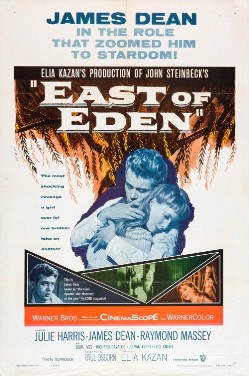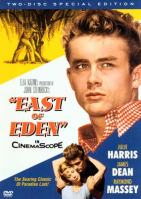 East of Eden. It was John Steinbeck’s epic work. Showcasing a familial narrative sprawled across his familiar locales of Salinas and Monterey over the turn of the century. But as a film, it rather unwittingly became James Dean’s. He wasn’t even a star yet. He had been on the stage and in a few small roles on television. His performance as Cal Trask was his first film role and the only one that ever got released during his lifetime. As his following two films, both premiered after his untimely death (curiously not all that far away from this film’s setting).
East of Eden. It was John Steinbeck’s epic work. Showcasing a familial narrative sprawled across his familiar locales of Salinas and Monterey over the turn of the century. But as a film, it rather unwittingly became James Dean’s. He wasn’t even a star yet. He had been on the stage and in a few small roles on television. His performance as Cal Trask was his first film role and the only one that ever got released during his lifetime. As his following two films, both premiered after his untimely death (curiously not all that far away from this film’s setting).
Director Elia Kazan utilized Technicolor and the harrowing perspective of Cinemascope to paint East of Eden with vibrant colors and rather unnerving angles. It’s also true that Kazan, known for evoking intense performances from actors bread on the Method, was more inspired than perhaps even he realized when he cast Dean. The actor’s body movements. His moody histrionics. His angst emanating from those piercing eyes of his. Even his terminal sadness channeled from his own real-life desire for his father’s love. It’s all within the role of Cal Trask and takes away any doubt about who the focal point of this film is.
And for some, this might be a rather glaring problem with the film. Kazan’s adaptation of the latter half of Steinbeck’s novel focuses on the Cain and Abel dynamic between brothers Cal and Aron as they vie for the affection of their father Adam. For the film to work, each of these characters should be on equal footing. And it’s true that the film is a pendulum of emotional turmoil. It’s positively charged with virulent intensity. First, it’s Cal who is angry and isolated as he tries to discover the whereabouts of the mother he never knew. Meanwhile, his brother Aron (Richard Davalos) is happily in love with his girl and readily defends his brother against any criticism.
But as Cal tries with all his might to win the affection of his father by any means possible, things begin to change. No, his father never exhibits the type of pleasure in him that he so desires, but in his struggles, Cal becomes closer with his brother’s girl — gaining her sympathy.
As time passes, the U.S. is teetering on the brink of the Great War and still, Cal cannot earn his father’s love and his brother becomes more and more jealous. As Cal comes into his own, showing a certain amount of industry and thoughtfulness, it seems Aron becomes more withdrawn and cold. And still, Adam loves his “good son” the best.
James Dean’s performance is spectacularly engaging. I would argue it’s not a morbid sense of curiosity that draws us to him as a tragic hero. But he truly had a special ability to control entire scenes with a glance or some slight movement. Like a Brando or a Clift, he had a certain ability to tap into something that classical actors couldn’t quite touch. Whether it was realism or not is slightly beside the point because they live in characters who are charged with real emotions. It makes Dean’s role as Cal Trask almost palpable. You can feel all that is going on inside of him.
It’s the fact that Dean is so memorable, that brings to light just how much some of the other roles pale in comparison. Davalos does a fine job in his first film, but he cannot balance the scales weighed down by Dean. Raymond Massey on his part is a fairly flat actor not given to anything altogether interesting. It is Dean who elevates Massey’s role in a sense (even though Massey despised the younger actor). Furthermore, Julie Harris is a reputable performer with great heart but she somehow seems miscast (perhaps she’s too old for her role). And Jo Van Fleet gets into the film with a few integral scenes but even she does not have enough time to neutralize Dean.
Perhaps it’s because of the now iconic screen tests of Dean and Paul Newman working off each other, but part of me wonders if Newman in the role of Aron could have done anything to counterbalance Dean. Part of me rejects this hypothesis because Newman never had the same type of melancholy or intensity that Dean was able to muster. He was the likable one. Still, it’s an interesting supposition that in no way takes away from the phenomenal way James Dean burst onto the scene in 1955. He was an explosive supernova of talent — unfortunately for us, he was snuffed out far too quickly.
4/5 Stars

